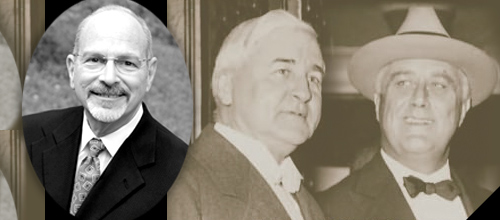The True Story of Jesse H. Jones

Steven Fenberg tells Jones’s story and how his ideas could help us today
by Marene Gustin • Photo by Talya C. Arbisser
Jones is a pretty common name. In Houston you can find Jones Hall, the Jones Graduate School of Business at Rice University, the Jones Rotary House Hotel at M.D. Anderson, and the Jones Pavilion at Memorial Hermann Hospital. All named for the same man: Jesse H. Jones. One of the most powerful men in U.S. history, he left his mark not only our city but also the entire country, something that a lot of people are hardly aware of today.
But Steven Fenberg is trying to rectify that. “If most people think of him today at all, they think of Jones Hall,” says Fenberg. “But he was the most influential man in America next to President Roosevelt.”
Fenberg is the community affairs officer at the Jones-founded Houston Endowment, executive producer and writer of the Emmy Award–winning documentary film Brother, Can You Spare a Billion? The Story of Jesse H. Jones narrated by Walter Cronkite, and now the author of a new book, Unprecedented Power: Jesse Jones, Capitalism, and the Common Good, published by Texas A&M University Press.
“Like so many Houstonians my age, I grew up riding the bus downtown to go to the movie theater he built,” recalls the 59-year-old Fenberg. “I’ve had an association with him my whole life.”
A writer and playwright—known in the community for his educational play AIDS: Just Say Know in the early ’90s—Fenberg wrote an article about the Houston Endowment’s AIDS funding in 1992.
The endowment, begun by Jones and his wife, Mary Gibbs Jones, in 1937 and with assets of $1.5 billion today, took notice and asked Fenberg to write a biographical sketch on Jones for the annual report. Then it was archiving Jones’s personal and business papers, a permanent exhibit and oral histories of those who knew him. Soon he had a job at the endowment, and then came the documentary and now the book.
“At this point, all that’s left is Jess Jones the Musical,” laughs Fenberg.
But that’s not to say Fenberg is obsessed with Jones. “People always think I named my 12-year-old Jack Russell terrier after him,” Fenberg says. “But I inherited J.J.—her name stands for Jumping Jack.”
Still, Fenberg may just be the ultimate authority on Jones. It took him six years to finish Unprecedented Power, and he credits his partner of 18 years with helping. “Harry does all the cooking and gardening,” Fenberg says. “Without his help, it would have taken me even longer.”
The biography is a fascinating read about the history of Houston and the man with an eighth-grade education who helped build the downtown skyline, saved the city’s banks during the Great Depression, and began one of most recognized philanthropic institutions. But more than that, it speaks to the country’s problems today.
Fenberg explains that Jones success at building his businesses and his community brought him to the attention of President Woodrow Wilson, who tapped him to become director general of military relief for the American Red Cross during World War I. During the Hoover administration he served on the board of the Reconstruction Finance Corporation. President Roosevelt made Jones chairman of the RFC and expanded its powers, allowing the agency to loan more than $10 billion to reopen banks and save homes, farms, and businesses from the brink of disaster.
But his work with the RFC during the New Deal not only helped the economy recover, it also returned a $500 million profit to the U.S. government.
“He had such a deep respect for the taxpayers’ money,” Fenberg says. “Then during World War II Jones and the RFC brought companies together to develop synthetic rubber for the war effort. It was a miraculous thing done in less than two years.” At that time our country was dependent on natural rubber, almost all of which was controlled by the Axis powers. Which sounds a lot like the energy crisis we’re in today.
“He offers so many models of how we could use today about grappling with the economic recovery, the role of government, and reliance on other nations for vital resources,” says Fenberg. So why is Jones mostly forgotten today? “I think it’s that we neglect history, at our own peril,” he adds.
Fenberg hopes that Unprecedented Power will help others to see the good that Jones did for Houston and the country, but he’s not optimistic that a new Jones could arise today.
“The rampant ideology and partisanship would not allow someone like this today,” he says.
But he does hope readers will take one thing away from his book. “If anything I hope that people will realize the government is not the enemy.”
Marene Gustin is a regular contributor to OutSmart magazine.










